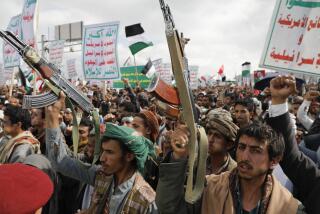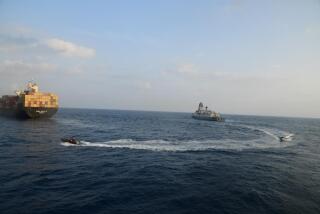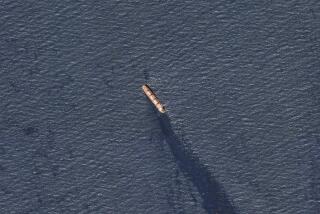Extreme security in Yemen after Al Qaeda terror plot is foiled
SANA, Yemen -- The Yemeni government deployed tanks and troops to guard its airports, oil terminals and foreign embassies Wednesday after claiming to have foiled an Al Qaeda plot to seize two ports and blow up pipelines.
Yemen’s Supreme Security Committee and Interior Ministry reported in a statement that government troops and security forces had discovered the plot last week and took measures to thwart what were to have been coordinated attacks on the country’s vital oil infrastructure on Monday.
The scene in the capital, Sana, was dominated by the deafening roar of aircraft patrolling overhead and tanks thundering around government buildings and diplomatic missions, many of them empty due to precautionary evacuations.
The siegelike atmosphere reflected continuing fears of militant attacks to mark the end of the Muslim holy month of Ramadan and the anniversary of a spectacular Al Qaeda terrorist attack 15 years ago. The coordinated Al Qaeda bombings of U.S. embassies in Kenya and Tanzania on Aug. 7, 1998, were the terror group’s first major display of its ability to strike multiple targets. The blasts killed 223 people and wounded more than 4,000.
News agencies in Sana reported a fifth U.S. drone strike in less than two weeks on Wednesday. The Al Jazeera news agency said rocket fire killed seven suspected militants, adding to the tension gripping the impoverished country at the strategic vortex of the Red and Arabian seas.
Yemen’s official Saba news agency reported that the Interior Ministry had ordered the massive security measures to protect foreign embassies and vital oil facilities through the rest of the week, during which Muslims will celebrate the Eid al-Fitr holiday that follows Ramadan.
Yemeni government spokesman Rajeh Badi said military forces had discovered and thwarted a plot by Al Qaeda to seize the port cities of Mukalla and Bawzeer. The terrorist group’s operatives were to be disguised as Yemeni soldiers and deployed to sabotage the Mina al-Dhaba oil terminal once they were in control of the ports, Badi told Al Jazeera and other news agency reporters in Sana.
“If they were to fail in seizing control of the facilities, the plan was to take foreign experts away as hostages,” Badi added.
The BBC quoted its reporter in Sana as describing security in the capital as “unprecedented,” with hundreds of armored vehicles deployed around the city and troops surrounding foreign missions, government offices and the airport.
U.S. intelligence services were reported earlier this week to have intercepted conversations between Al Qaeda leader Ayman Zawahiri and the de facto commander of the terror network’s Yemeni offshoot, Al Qaeda in the Arabian Peninsula, involving a plot to attack unspecified Western interests.
Russell Howard, a retired general and special operations strategist now directing the Monterey Terrorism Research and Education Project, said Zawahiri’s deputizing of AQAP leader Nasser Wuhayshi “may mean that AQ Central is attempting to reassert itself in a major way by enlisting AQAP to take on more ‘far target’ operations.”
He referred to the terror network’s efforts to direct attacks in the United States such as the attempted Christmas Day 2009 bombing of a Detroit-bound airliner by an AQAP-trained Nigerian with explosives hidden in his underwear.
The intercepted “chatter” between Al Qaeda groups compelled the State Department to issue a worldwide travel alert on Friday and to close more than 20 diplomatic facilities in the Muslim world through the tense holiday season. Britain, France and Germany have also evacuated their diplomatic posts in Yemen, and other European countries have advised their nationals to leave.
The English-language Yemen Post reported Wednesday that U.S. fears of being targeted by Al Qaeda took on new intensity over the weekend when authorities discovered that Al Qaeda in the Arabian Peninsula’s master bomb maker, Ibrahim Hassan Asiri, has developed a new hard-to-detect liquid explosive to use in terror attacks.
ALSO:
Iran’s new president prompts renewed Israeli threats
Egypt’s president says diplomacy by U.S., others fails to end crisis
Obama cancels meeting with Putin after Russia grants Snowden asylum
Twitter: @cjwilliamslat
Special correspondent Al-Alayaa reported from Sana and staff writer Williams reported from Los Angeles.
More to Read
Start your day right
Sign up for Essential California for news, features and recommendations from the L.A. Times and beyond in your inbox six days a week.
You may occasionally receive promotional content from the Los Angeles Times.







